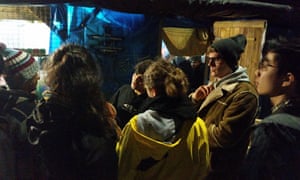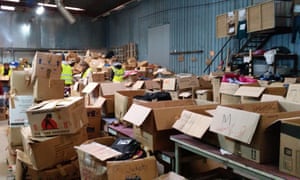
Students in the UK have been instrumental in organising aid collections andshowing support for refugees since this summer, spurred on by heightened media coverage of the crisis that has gripped Europe.
Since then, the number of people taking refuge in the Calais jungle has risen tomore than 6,000, most fleeing conflict, violence and poverty in countries including Syria, Afghanistan, Eritrea and Kosovo.
The camp’s poor hygiene and ramshackle living conditions are a breeding ground for health problems. These include respiratory infections from the cold, infected cuts from barbed wire, scabies from living in overcrowded tents, eye problems from exposure to tear gas, fractures and sprains from falls related to the migratory journey and post-traumatic stress and psychological disorders.
Many of the UK’s medical students have stepped up to help however they can, with some even making the journey to Calais. Here’s how they’re getting involved:
Contents
Providing medical assistance in Calais
Anyone trained in first aid is useful at the camp, where medical provision is patchy and relatively scarce. Hannah Vandersluis, 21, a third-year medical student at Cambridge, volunteered in Calais earlier this month with theCambridge University Calais Refugee Action Group (CUCRAG), and spent an afternoon working with a doctor in a medical caravan. As a pre-clinical student, she was unable to provide full medical care to refugees, but could offer first aid and give out paracetamol for headaches, ibuprofen for musculoskeletal pain or inflammation and lozenges for sore throats.
The rules about how involved medical students can be in treating people in Calais are unclear and medical courses in the UK structure their clinical teaching differently, so some students are capable of doing more earlier than others. Medical students wanting to volunteer should seek advice from the British Medical Association, the Medical Protection Society or the Medical Defence Unionbefore heading out to France. Vandersluis recommends that future medical students bring their hospital ID if they have one, or a letter from their university confirming they are a medical student. At the moment, there is no one in charge of the camp, and so no one to confirm that medical volunteers are actually medically trained
“I didn’t have a lanyard with an ID card saying ‘medical student’ like I would in the UK,” says Vandersluis. “But then again, neither did the doctor I was working with.”

Lots of injuries happen at night, such as those resulting from violence and scaling fences, when there is a particular shortage of first aid and medical care available. Vandersluis says there was limited help she could offer in such cases. “We cleaned, dressed and re-dressed wounds like these, but those we suspected of being infected we advised to go to Médecins Sans Frontières (MSF).”
“The doctor I was working with said when she got back to where she was staying the previous night she just cried and cried because of how helpless she felt after a day largely consisting of giving paracetamol,” says Vandersluis. “There’s something very depressing about being capable of providing quality medical care while totally lacking the resources and infrastructure to do so.”
Memories of her experience continue to worry Vandersluis. She recalls meeting a nine- or 10-year-old boy with no family – his dad is likely to have died on the journey – and an arm that had been broken by riot police. “I still think about him and hope that he’s safe with the people who’ve taken him in.”
Fundraising and engagement on campus
New ways for students to help refugees are being developed closer to home, and fundraising is easier than ever. Harriet Hubbard, 24, is a medical student at the University of Southampton considering a career in humanitarian medicine. Frustrated with the media’s coverage of the crisis this summer, she joined Calais Refugee Solidarity Bristol to help coordinate donated funds and got in touch withDoctors of the World (DOTW), a humanitarian medical charity that cares for migrants and refugees, the only long-term medical facility on the ground in Calais, and one of the Guardian’s chosen charities for its 2015 fundraising appeal.
Hubbard joined DOTW on a visit to Calais in September and was moved by what she saw. “It was really traumatic – I only processed what I’d seen when I got home,” she says. “I’ve been to a Nairobi slum and it was like someone had cut out a bit from the slum and put it in Calais.”
DOTW has recently stepped up its engagement with students, launching a new programme at Southampton last month with Hubbard’s help. In Residence is a formal platform through which students can fundraise for refugees, raise awareness of the issue, get more deeply involved in the charity’s work, or even set up their own DOTW health project. The charity hopes to launch at more universities with medical schools in 2016.
In the UK, 30% of the charity’s volunteers are already students. Most of whom study at King’s College London, University College London, Imperial and the London School of Hygiene and Tropical Medicine.
Tom McKenzie, business development and innovation manager at DOTW UK, says: “We’ve seen a huge increase in interest from students organising events at their university who would like a Doctors of the World representative to attend or just simply wanting to fundraise.”
Doctors Without Borders, aka Médecins Sans Frontières (MSF), has a similar programme called Friends of MSF, through which students all over the UK have fundraised for refugees and organised speaking events, debates and discussions on migration.
Volunteering at UK-based clinics
Students have also been putting in the hours in admin roles to assist vulnerable people affected by the refugee crisis who have made it to the UK. DOTW relies on students’ help in its volunteer-led clinic in Bethnal Green. It has an open door policy, welcoming everyone regardless of their immigration status and putting patients in touch with medical services such as GP practices. Volunteers often come into contact with people with chronic conditions, such as diabetes, which have been untreated because they don’t have access to a GP.
Belinda Chihota, 22, a master’s student at the London School of Hygiene and Tropical Medicine, volunteers with DOTW at both its Bethnal Green clinic and as a caseworker at its head office. She helps people to register with GPs, addresses difficulties they are facing with NHS services, and books people’s appointments with the charity’s volunteer clinicians.
Chihota says she has been humbled by her experience: “As a student one can easily become engrossed by the medicalisation of individuals, but I have always urged myself to remember that patients are people with genuine non-medical problems.”
Vandersluis came away with mixed feelings after her experience in Calais. “It was equally despairing and rewarding. It was despairing because these people need and deserve so much more in terms of medical care, which clearly as a medical student I am unable to provide.”
But she is comforted by the fact that at least had something to offer and would encourage all students to volunteer in whatever capacity they can – be it in a warehouse or medical care. Neither of which are taken for granted.
[Source:-the gurdian]
